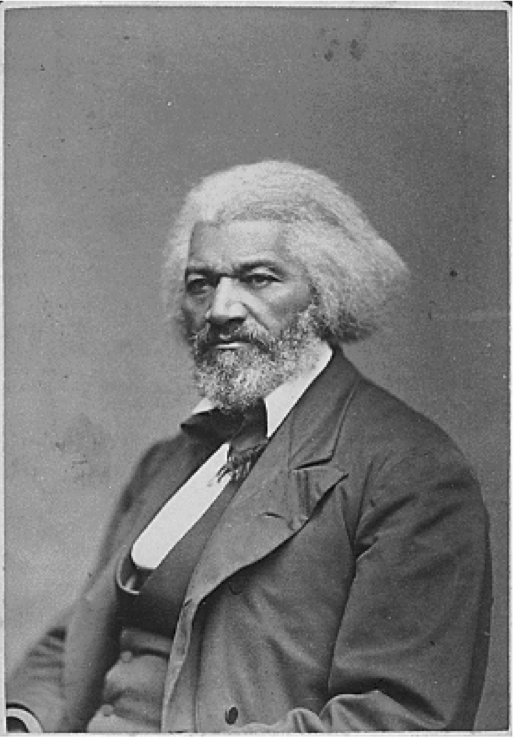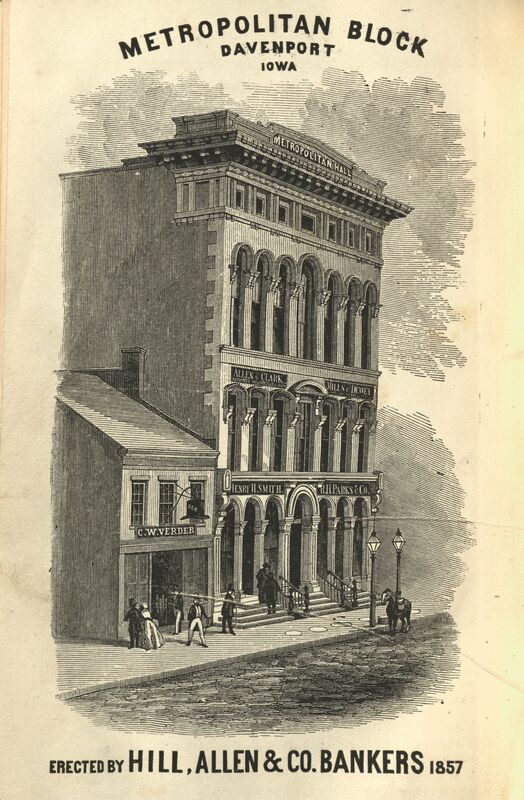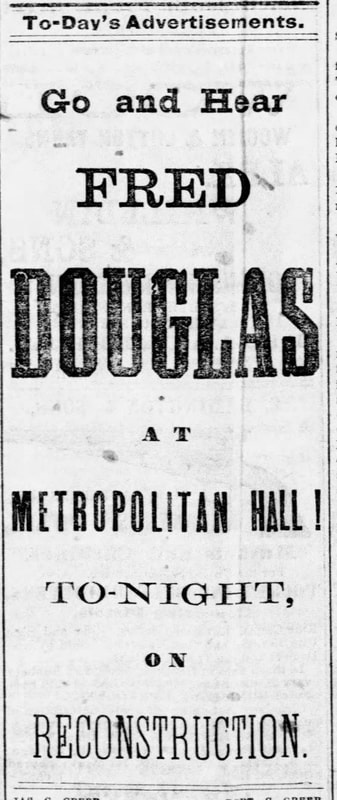Did You Know That Frederick Douglass Visited
Davenport in April of 1866?

Frederick Douglass
(image courtesy of the Library of Congress)
During a lecture tour in Iowa and Illinois in late April 1866, black anti-slavery advocate Frederick Douglass spoke before a standing-room-only audience in Davenport's Metropolitan Hall on April 27, 1866. Addressing the question of What shall be done with the negro? during the period of Reconstruction, Douglass eloquently appealed for black male suffrage and full political equality before the law. Well received by his listeners, his extemporaneous talk lasted two hours.
Craig Klein shared this 1857 artist's sketch of Metropolitan Hall, where Frederick Douglass spoke. The Davenport Public Library special collections department located the image.
As part of PACG's on-going fundraiser to pay for a large kiosk display at the MLK Interpretive Center, Frederick Douglass's lectures in Iowa and Davenport are the subject of this week's blog post about local cultural and ethnic history.
Frederick Douglass (c. February 1818 – February 20, 1895) was an American social reformer, abolitionist, orator, writer, and statesman. After escaping from slavery in Maryland, he became a national leader of the abolitionist movement in Massachusetts and New York, gaining note for his oratory and incisive antislavery writings.[1]
Local historian Craig Klein has gathered the following information from newspaper articles in Iowa. We have decided to post them here in their original format because the language and descriptions used by the articles' authors is definitely a part of this rich history.
April 25, 1866 (Wednesday)—Davenport Daily Gazette--Announcement of Frederick Douglass' lecture schedule:
By letters received from George S. Bowen, Esq. of Chicago, his Western Agent, we see Mr. Douglass has refused over thirty invitations to lecture in the West from lack of time. He speaks in Moline Wednesday night, Muscatine Thursday, Davenport Friday, Morris Saturday, and Chicago next Monday, and is paid $100 for each lecture. [note: in 2020 this fee would be just over $3000.]
April 27, 1866 (Friday)—Davenport Daily Gazette--News item entitled The Lecture To-Night
The orator who to-night addresses our citizens at Metropolitan Hall was once and for many long and bitter years a slave-owned, held, and assessed as “chattels personal.” At length he yielded to the promptings of his nature, gave scope to his ardent yearnings, and sought freedom in flight towards the North Star. Then followed earnest efforts for knowledge; prolonged conflict with poverty; fierce contests against the hateful spirit of caste, which denied him his manhood; and, a length substantial victory. In this at least, his triumph is complete in earning and winning for himself a confessed intellectual equality with the ablest and best logicians and orators of the country, and an undeniable superiority to thousands who in speeches in the legislative halls and on the stump have vainly tried to establish color of skin as a test of mental power, political rights, and moral worth. This self-made man--if ever a man made himself by the industrious cultivation of God-given power is now one of the best, to say the least, public speakers in the United States. Everywhere crowded audiences listen to and are profited by his irresistible arguments and eloquent appeals; and everywhere those who listen once would gladly hear again. We need urge no friend of freedom to attend Metropolitan Hall tonight. We would rather urge the attendance of those who have hitherto denied the capability of the colored race and would yet deprive them of full political equality before the law. We could wish that every “anti-negro suffrage” man in this vicinity might hear Mr. Douglass tonight, and then tell us, if possible, why color of the skin should longer be the test of fitness to use the ballot. There will be a crowded house tonight, sure, and we advise those who want good seat to go early. Tickets at Luse & Griggs'.
April 28, 1866 (Saturday)—Davenport Daily Gazette--Newspaper article entitled Fred. Douglass on Suffrage that summarized and commented on Douglass' talk the previous evening:
The lecture of Fred. Douglass at the Metropolitan Hall last night, delivered to an audience which crowded every available seat and in part only found standing room, embraced and was mainly composed of a solid, logical earnest and unanswerable argument in behalf of impartial and universal suffrage. “Reconstruction” was announced as the subject of the lecture, but that was but the text for the real theme. Introducing text and argument by a rapid glance at the grave perils which now environ the country, with a President determined to enforce his policy if at all within the reach of possibility, with traitors where loyal men only ought to be and loyal men in places which traitors ought to fill, Mr. Douglass proceeded to state that the whole question of “Reconstruction” centers in and is embraced in the solution of the negro problem. “What shall be done with the negro” this lecturer urged is the question of the hour. The answer was given by Mr. D. in a word--Give the negro the ballot; and to the support and defense of this answer the lecturer devoted the greater part of his effort. He argued that the elective franchise should be extended to the negro because he is “a man;” because the ballot is necessary for his education; because it is essential to his protection; because he has earned it; because the Nation owes it to him for his help in the hour of trial and danger; because the Nation may need him again; because without giving it the National honor cannot be vindicated; because this is a country of universal suffrage; because the National peace will be hereby assured; and because sound Statesmanship requires it. In enforcing these several reasons, Mr. Douglass presented argument after argument in a manner so clear and so convincing that it would seem impossible for any intelligent listener to escape his conclusions. He showed how well and how nobly the negroes of the United States have vindicated their manhood, and how heroically they have attested their devotion to a country to which they owed nothing and from which they had received nothing but oppression and wrong. He demonstrated the utter folly of the colonization scheme. He exposed to deserved ridicule the idea that the negro must become annihilated and the whole race, in the United States, become extinct under the advancing tread of Anglo Saxon civilization; and made his hearers understand very clearly that the last hope of the extinction of the American negro expired with the death of that system under which alone there was possibility that they could “fade” out.
The objections to negro suffrage were briefly but forcibly met, particular attention being given to those on which Mr. Johnson lays so much stress. Mr. Douglass showed conclusively that no possible evil would or could result from the doings of justice to all men in the Republic and the carrying out of the great principles of the Declaration of Independence and of the Constitution.
Thus much as a faint outline of this very able lecture. Of its delivery we need only say that Douglass has lost much of his fire since we first heard him, in Albany, nearly twenty years ago. His utterance is very deliberate and at times unpleasantly slow. He seldom indulges in pathos and his style is entirely free from labored attempts to arouse the feelings of his auditors. As stern fact, a new idea or an old one presented in a fresh light, a strong argument, a fervid appeal or a happy hit, over and anon occasions an outburst of applause, but no metaphors, illustrations or anecdotes are introduced by the lecturer to that end. The lecturer and his audience move steadily on from premises to argument and from argument to conclusion, under the pressure of words simple and well chosen for that end. Here is his strength as a public speaker. Even while listening to him and moved by his argument and appeals, one is inclined to deny him the praise of being a great orator; yet if the provinces of oratory is to convince and arouse those to whom its words are addressed, it would be difficult to name many living orators, in the United States at least, greater than Fred. Douglass. With more of the fire of youth, he would entrance and inspire an audience as powerfully as he now instructs and interests. Yet this “man” was once and long a slave in these United States, and today if a citizen of Iowa, native American though he is, could not vote for a town constable, while thousands who were ten, eight or six years ago in other lands in utter ignorance of American institutions are gladly welcomed to the ballot box! “This ought ye to have done and not left the other undone!” Let us pray for and “work” for, and fight for the grand victory for Justice and Liberty when all men of every race and color shall enjoy that perfect equality before the law that is their just due. In Iowa, at least, the battle has been well begun. The victory is surely coming and cannot be delayed.
The lecture occupied two hours in delivery and was almost wholly extemporaneous; Mr. Douglass had several sheets of notes but referred to them but three or four times.
You can help preserve this history like this by making a donation to purchase a display screen for the Martin Luther King Interactive Center.
For other Blogs in support of this project, see also:
Did You Know About African American Women's Clubs in Davenport During the Progressive Era?
Did You Know That Aeronaut Professor John Byrd Piloted His Balloon from Davenportin August of 1883?
[1] https://en.wikipedia.org/wiki/Frederick_Douglass



 RSS Feed
RSS Feed


